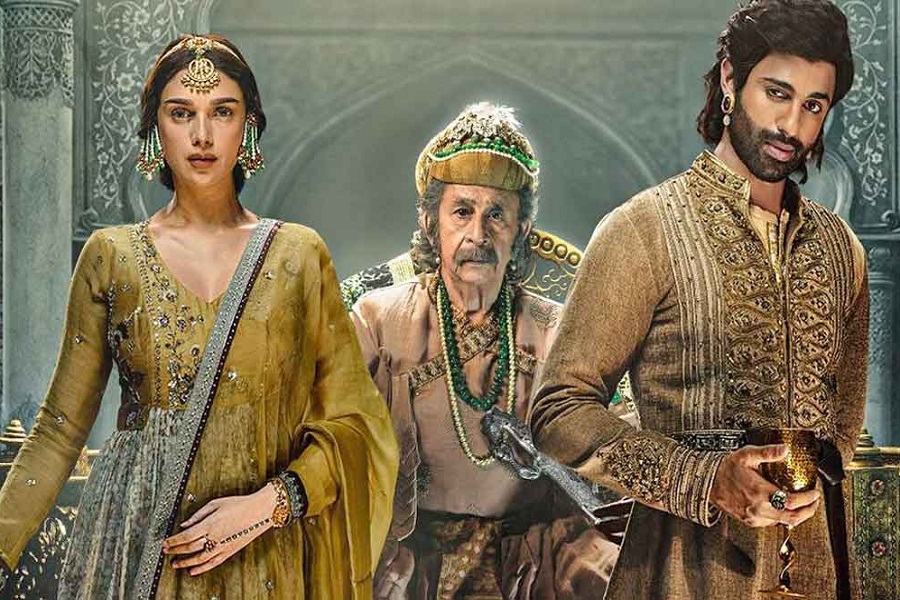Retelling of Mughal history in the web series 'Taj: Divided by Blood'

Published :
Updated :

The Mughal Empire was among the most powerful empires in the Indian subcontinent. They ruled India for over three centuries, from the early 16th century until the mid-19th century. During this period, the Mughal emperors were known for their love of art, culture, and architecture, as well as their military conquests and political dominance.
However, in recent years, the portrayal of Mughals in Hindi cinema and web series has drastically shifted. How and when did this drastic shift start, and how has it been practised? Analysing the recently released web series 'Taj: Divide by blood' can shed some light on the topic.
Released on 3rd March this year, 'Taj: Divided by Blood' is a web series with all the elements of retelling history.
Where to begin with?
Characters are the simple choice to demonstrate the current trend when there is much room for error in the plot.
Portrayed by the seasoned actor Naseer Uddin Shah, the love triangle between Emperor Akbar, his concubine Anarkali (Aditi Rao Haidary), and his son Prince Selim the next Mughal emperor, is the focus of the web series.
Akbar is shown as a cruel, cold-hearted man obsessed with power and will stop at nothing to keep it. Selim is one of the primary candidates in the series' depiction of the power struggle between the various factions in the court over the throne's succession.
The triangle of passion, an old-fashioned love story, has planted the seeds of a succession race among the Mughal blood that would dominate India. The plot is more of a triangle of stupidity than a love triangle, though, as there is no evidence of love between Akbar and Anarkali.
It was depicted as an imposed one-sided love from the emperor Akbar, and as a result, the story of the retelling of Mughal histories on screens has advanced.
Akbar is portrayed as incredibly cowardly and incapable of making decisions for himself. He is incessantly enraged and violent. The emperor was renowned for his justice and distinctive jurisdictions, but the makers of the web series don't seem to have researched any historical material.
According to Abraham Earley, Anarkali might have given birth to Akbar's third son, Daniel Mirza, who wrote about this in his book 'The Final Spring - The Lives and Days of the Great Mughals.' According to William Finch, Anarkali was Daniel's mother. Nevertheless, many historians disagree with it.
Depiction of homosexuality is also common in today's films and web content. In this web series, the homosexual affair between Prince Danyal and his servant Vivaan seems to fit in forcefully to go with the trend and has no connection with reality.
Known as the 'Majnoon Shehzada' (alcoholic prince) in history, Prince Selim depicts more of a Romeo who is a selfish loser both as a lover and a friend. These three main characters are the cards that the makers played to portray the ongoing narrative of 'Rajput-favoured anti-Mughal storytelling.'
What is the 'Rajput-favoured anti-Mughal storytelling?'
A powerful illustration of what this story offers the audience is 'Taj: Divided by Blood.'
Maharana Pratap is, without any doubt, one of the greatest warriors in Indian political history. But, the director's treatment of Maharana Pratap was intended to elevate the personality and diminish Akbar's reputation.
Emperor Akbar is dishonest and terrified of Pratap, but Maharana Pratap is powerful and doesn't respect Akbar; instead, he feels sorry for him because Akbar is growing older.
Akbar always seems to laud Rana Pratap in the web series, displaying respect due to the Rajputi Royalty. On the contrary, Maharana Pratap once criticised Abul Fazal, one of the nine people closest to Emperor Akbar and the author of the book 'Akbarnama,' for his promise to put an end to Prince Selim's hopes of succeeding his father.
The glorification was exaggerated to the extent that it was falsely claimed that Maharana Pratap won the battle of Haldighati, which was fought between the Mughals and Rajputs.
Moreover, Rajputs are shown as revered fighters, like in the persona of Raja Man Singh (the General of the Mughals and also a part of the 9 closest men of the emperor). The makers attempted to convey how his devotion to the empire was in vain and that Emperor Akbar didn't treat him with the respect he deserved.
Egotist Akbar gave Raja Man Singh's son the death penalty. According to Raja Man Singh, in this web series, everybody who provides services to the Mughals has forfeited their dignity, transformed into a slave, and paid the price for it.
When did the story's recounting start?
With the release of the movie Bajirao Mastani in 2015, the trend began to appear on the screen. Historians like Ramchandra Guha and Dr Ram Punyani have pointed out the flaws in how India tells its history now, favouring the majority while ridiculing the Muslim minority.
Similarly, the Mughal emperor Babur is presented in the web series 'The Empire' as a shrewd and ruthless leader hungry to expand his kingdom. Babur is portrayed in the series as a man who won't hesitate to use coercion and violence to further his agenda.
Overall, the web series 'Taj: Divided by Blood' illustrates how Hindi cinema has misrepresented the history of the Mughals and Muslim rulers.
Akbar was known for his religious tolerance, which allowed people of all faiths to live and worship in peace. But the series perpetuates negative stereotypes about Muslims and the Mughal Empire by portraying Akbar as a weak and brutal ruler while ignoring his many contributions to Indian society and culture.
mohd.imranasifkhan@gmail.com


 For all latest news, follow The Financial Express Google News channel.
For all latest news, follow The Financial Express Google News channel.